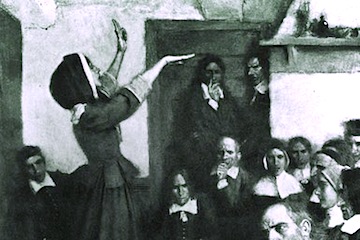Women's History
The status of women varied widely across the different groups and eras of American history. The most important advance was the 19th Amendment in 1920, which allowed them the right to vote. In general, women are more equal and autonomous in the modern era than they have been throughout the past.
Recommended Reading
- Gail Collins - America's Women: 400 Years of Dolls, Drudges, Helpmates, and Heroines (P.S.)
- Pocahontas - Joseph Bruchac
- Selected Writings of Judith Sargent Murray (Women Writers in English 1350-1850) - Judith Sargent Murray
- The Road to Seneca Falls: Elizabeth Cady Stanton and the First Woman's Rights Convention (Women in American History... - Judith Wellman
- Daring to Care: American Nursing and Second-Wave Feminism - Susan Gelfand Malka
- Judith Sargent Murray: A Brief Biography with Documents (Bedford Series in History & Culture) - Sheila L. Skemp
- Harriet Tubman: Conductor on the Underground Railroad - Ann Petry
Anne Hutchinson and the Puritan Trials
Anne Hutchinson's theological views resulted in her banishment from Massachusetts in 1638.
Timeline
- c.1000 - The position and role of women in the American Indian tribes varies widely -- tribes such as the Cherokee and Iroquois maintain a matrilineal family structure.
- 1790 - It is estimated that the fertility rate per American woman averaged 8.0 children over the course of a lifetime -- higher than modern-day totals in Niger or Mali.
- 1837 - Sarah Josepha Hale becomes the editor of Godey's Lady's Book, a position she will hold until 1877. This popular magazine advances the ideals of "Republican Motherhood".
- 1848 - The Seneca Falls Convention, led by Elizabeth Cady Stanton and Lucretia Mott, produces The Declaration of Sentiments and Resolutions advocating for women's equality.
- 1852 - Harriet Beecher Stowe publishes her controversial anti-slavery novel, Uncle Tom's Cabin. Northern women participate disproportionately in the abolitionist movement during the 1850s.
- 1869 - Wyoming becomes the first territory to grant women the right to vote.
- 1893 - Queen Lili'uokalani of Hawaii is overthrown by a group of European and American business leaders, against the wishes of most natives. Hawaii is then annexed to the United States in 1898.
- 1920 - After a suffragist campaign of decades, the 19th Amendment grants the vote to women.
- 1921 - The Sheppard-Towner Act is passed in the wake of women's suffrage to fund federal prenatal care programs. It is allowed to lapse in 1929.
- 1921 - Edith Wharton becomes the first woman to win the Pulitzer Prize for Fiction for her novel, The Age of Innocence.
- 1941-1945 - About 3 million women take jobs in the munitions and war production industries. The unemployment rate drops to 1.4% in 1944.
- 1945-1964 - The Baby Boom generation is born as postwar fertility peaks at 3.8 children per American woman in 1957.
- 1960 - "The Pill" is approved by the FDA on June 23. It usage will become legal in every state with the Eisenstadt v. Baird decision in 1972.
- 1981 - Women earn over 50% of American college degrees for the first time in history.
ERAS:
Pre-Contact - Colonial - Revolutionary - Antebellum - Civil War - Gilded Age - Depression/World War II - Modern
PEOPLE:
American Indian - Anglo/Scottish - Black - Hispanic - Women - Asian - LGBT - Irish - Jewish - Children
